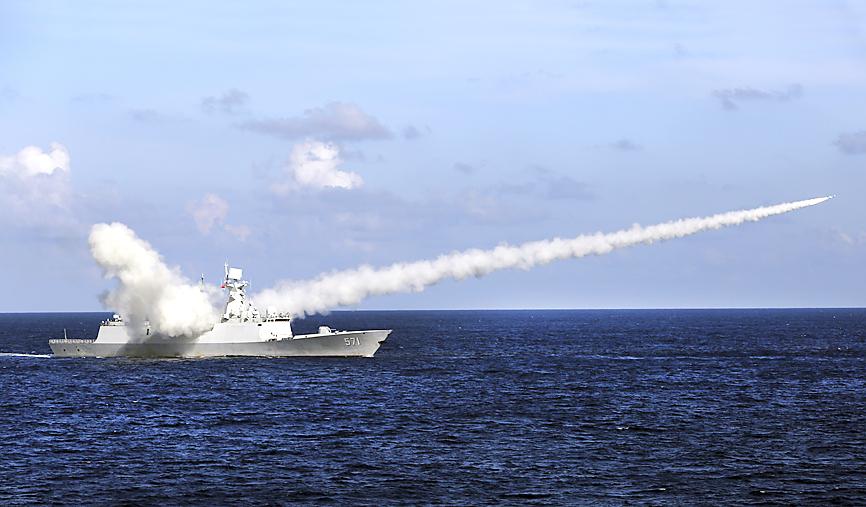The Ministry of Economic Affairs (MOEA) yesterday said that chips from Taiwanese semiconductor companies were not making their way into Chinese missiles “to the best of our knowledge.”
A report in yesterday’s Washington Post alleged that a Chinese company named Phytium Technology Co (飛騰) used chips made by Taiwan Semiconductor Manufacturing Co (TSMC, 台積電), along with US software, in advanced Chinese military systems.
“TSMC has long placed strict controls on their chips. The export of high-tech products from Taiwan is also highly regulated,” Minister of Economic Affairs Wang Mei-hua (王美花) said.

Photo: Zha Chunming / Xinhua via AP
“According to our understanding, none of the end uses for those products was military,” she added.
“To the best of our knowledge, TSMC’s exports not only meet Taiwanese standards, they also comply with applicable US regulations,” Wang said. “If information emerges that shows differently, we will of course investigate.”
Given the high volume of chip exports from Taiwan, the Bureau of Foreign Trade would educate exporters more to ensure that Taiwanese and international regulations are being followed, Wang said.
“TSMC has a rigorous export control system in place, including a robust assessment and review process on shipments to specific entities that are subject to export control restrictions,” the chipmaker said in an e-mailed response to the report.
“Moreover, TSMC has put in place processes to help identify abnormal circumstances in a transaction with due-diligence follow-up. With these processes already in place, we are not aware of a product manufactured by TSMC that was destined for military end-use, as alleged in the coverage,” it said.
The Washington Post article cites Ou Si-fu (歐錫富), a research fellow at the Institute for National Defense and Security Research (國防安全研究院), as well as an anonymous analyst.
Ou told the Taipei Times by telephone that he cannot speak specifically in regards to Phytium, but that the use of Taiwanese chips in Chinese military equipment would be “hard to trace.”
“The problem is that the chips are dual-use technology. They can be bought off the shelf for one application and then used in military equipment that is aimed right back at Taiwan,” Ou said.
Current Taiwanese and US safeguards for preventing Taiwanese chips from ending up in Chinese munitions are inadequate, Ou said, adding that meaningful measures for tightening up the flow of chips to China must come from the US.
“The US is ultimately in control of the upstream technology and equipment for the chips, even though Taiwan is the manufacturer,” Ou said. “They must be the ones to crack down.”
When asked whether Taiwanese can simply choose not to sell advanced chips to China, Ou said that it was unlikely.
“It would be asking them to voluntarily make less money and offend the Chinese at the same time,” Ou said.

OPTIMISTIC: The DGBAS sharply upgraded its GDP growth estimate from 3.54 percent to 7.71 percent after the Taiwan-US trade agreement signing and given AI optimism The US imported more from Taiwan than China for the first time in decades, as US President Donald Trump’s tariffs reshape trade flows while a global boom in artificial intelligence (AI) fuels demand for tech products. US purchases of goods from China plunged almost 44 percent in December last year from 2024 to US$21.1 billion, US Department of Commerce data showed on Thursday. By contrast, shipments from Taiwan more than doubled during the same period to US$24.7 billion. The soaring Taiwanese shipments to the US reflect the huge expansion in supplies of chips and servers for AI companies, which has completely changed

The Central Election Commission has amended election and recall regulations to require elected office candidates to provide proof that they have no Chinese citizenship, a Cabinet report said. The commission on Oct. 29 last year revised the Measures for the Permission of Family-based Residence, Long-term Residence and Settlement of People from the Mainland Area in the Taiwan Area (大陸地區人民在台灣地區依親居留長期居留或定居許可辦法), the Executive Yuan said in a report it submitted to the legislature for review. The revision requires Chinese citizens applying for permanent residency to submit notarial documents showing that they have lost their Chinese household record and have renounced — or have never

US and Chinese fighter jets briefly faced off above waters near the Korean Peninsula this week, Yonhap News agency reported, marking a rare confrontation in that area between the two superpowers. About 10 US fighter jets on Wednesday departed an airbase in Pyeongtaek, South Korea, for drills above international waters off South Korea’s western coast, the news outlet cited unidentified military sources as saying. While the US planes did not enter China’s air defense identification zone, Beijing scrambled planes as they neared that region, the report said. “The Chinese People’s Liberation Army organized naval and air forces to monitor and effectively respond

Taiwan has secured another breakthrough in fruit exports, with jujubes, dragon fruit and lychees approved for shipment to the EU, the Ministry of Agriculture said yesterday. The Animal and Plant Health Inspection Agency on Thursday received formal notification of the approval from the EU, the ministry said, adding that the decision was expected to expand Taiwanese fruit producers’ access to high-end European markets. Taiwan exported 126 tonnes of lychees last year, valued at US$1.48 million, with Japan accounting for 102 tonnes. Other export destinations included New Zealand, Hong Kong, the US and Australia, ministry data showed. Jujube exports totaled 103 tonnes, valued at